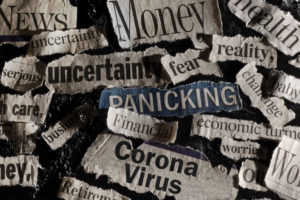What's On This Page?
ToggleWhile it’s true that natural antidepressants such as St. John’s wort can lift mood, it is a gentle effect, and by no means a cure for serious problems such as major depression with or without suicidal ideation. But it is a favorite for millions of people who use this beautiful flowering herb for their mood. Let me tell you why I am writing about it today.
A friend of a friend committed suicide this past month, and I knew and liked him. I’m sad about this, and so I’m prompted to write this article today on the world’s most beloved plant-derived antidepressant.
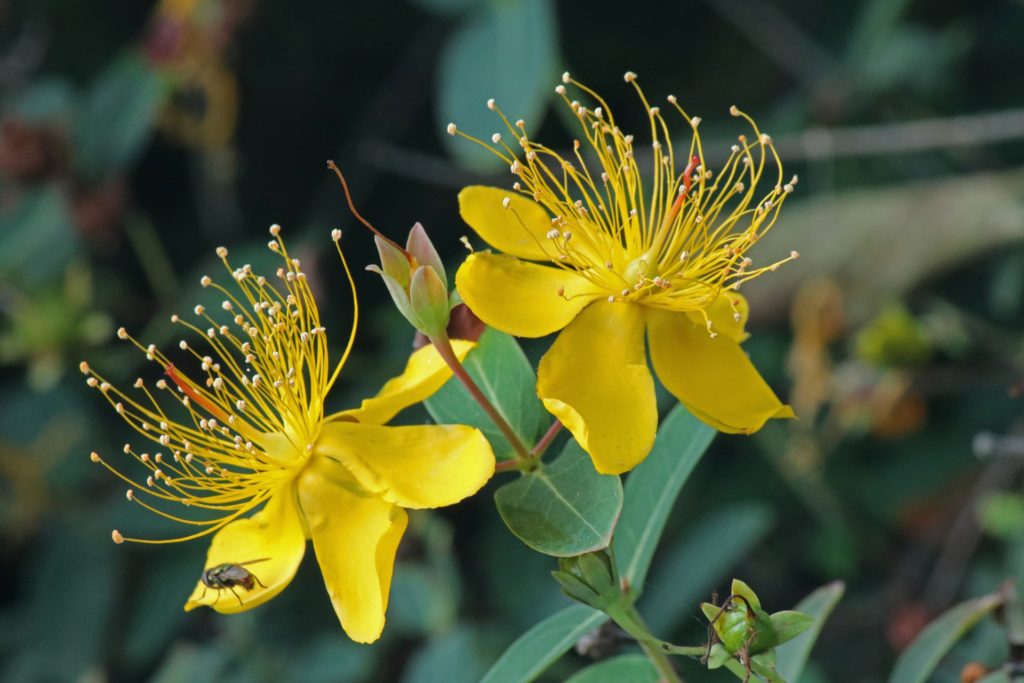
As you can see, St. John’s wort is a beautiful plant with yellow flowers, and it grows wild in many parts of the world. Ironically, its name doesn’t quite have the same beautiful effect – who wants to touch something that’s called a wort lol? Actually, it’s just the old English word for “plant,” so it’s not as bad as it sounds. Its botanical name is Hypericum perforatum.
Extracts from this little plant have been used for centuries as an herbal remedy for all sorts of medical problems. As a dietary supplement, St. John’s wort is probably best known for its positive impact on mild depression and overall mood.
How does St. John’s wort affect mood?
Although research is ongoing, a large part of the magic lies in its impact on those tiny chemicals that hold the keys to brain function and mood: Neurotransmitters! For a long time, “hypericin” was thought to help with the blues, however, scientists are noting that another compound in the plant called “hyperforin” plays an even bigger role. There are thousands of biologically active components to the plant so I’m sure time and research will reveal other compounds in addition to these.
Neurotransmitters are simply small molecules used by neurons to communicate with each other. Five of the major ones include:
- Serotonin: Mood, sleep, cravings for carbohydrates
- Dopamine: Passion, mood, focus, reward and motivation
- Norepinephrine: Energy and concentration
- GABA (gamma amino butyric acid): Relaxation and sleep
- Glutamate: Learning and memory as well as muscle health
These mechanisms of action I’ve just listed are rather oversimplified, I just want you to see that one neurotransmitter impacts your body from head to toe, so when you take an herb like St. John’s wort, you’re going to see a whole-body (systemic) effect. But serotonin isn’t the be-all, end-all of happy brain chemicals.
Some research suggests that depression is really tied to dopamine deficiency, the same compound that is implicated in schizophrenia, Parkinson’s and gambling. If you’d like to read my other article about dopamine and other important neurotransmitters CLICK HERE to read, Have You Stopped Enjoying Life? It Could be Low Dopamine.
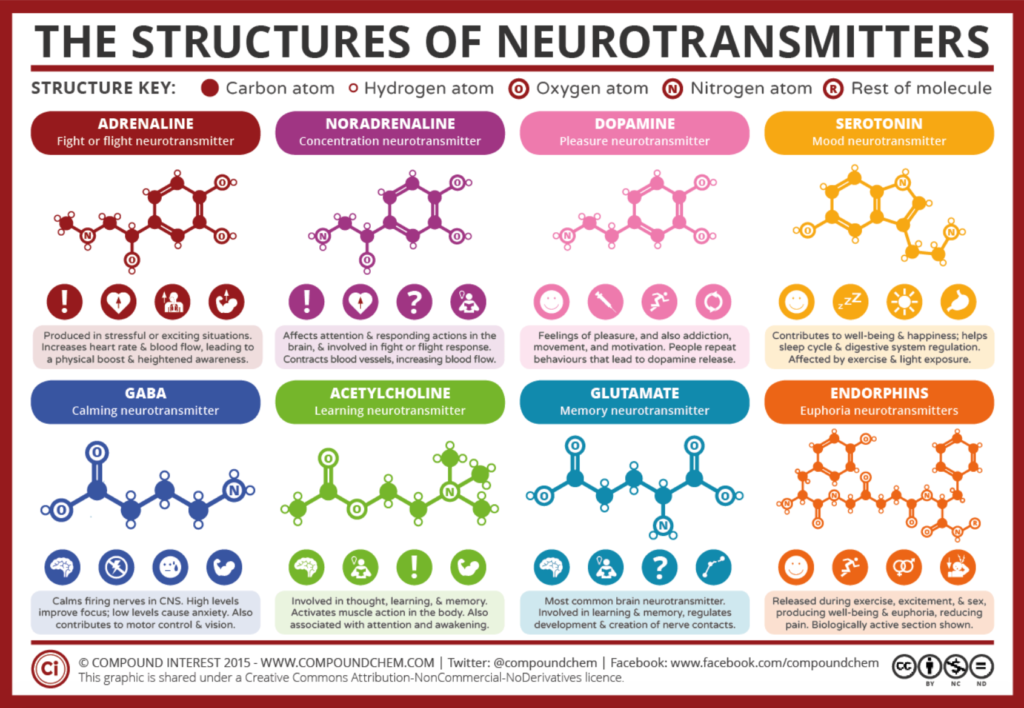
The ways in which different neurotransmitters interact are very complicated and are only beginning to be understood. For that matter the ways that medications impact your neurotransmitters is also very complicated! You should take a minute and CLICK HERE to read my article, How Pain Killers Kill Your Pleasure.
Medications, herbs, and supplements that act on the gut or on the brain directly often affect the levels of one or more neurotransmitters. One little known fact is that your gut makes about 90 to 95% of your neurotransmitters, yet they impact how your levels of happiness, satiety, anxiety, sleepiness and tearfulness. What you eat matters too. Bananas are a prime example. If you love bananas, CLICK HERE to read how they impact dopamine: Eat Bananas in the Pursuit of Happiness.
Serotonin and mood
Serotonin is impacted by St. John’s wort. Serotonin is one of many “happy” brain chemicals (neurotransmitters). Levels of serotonin are thought to be deficient in the brains of people who suffer with depression which is why there are so many antidepressants targeting the serotonin pathway. You’ve heard of SSRI drugs like Prozac, Zoloft and others. Selective serotonin reuptake inhibitors are SSRI drugs. These medications increase serotonin activity in your brain.
For years, the deficiency of serotonin was believed to be the sole (or at least the main) cause of depression, although it’s not actually clear whether low serotonin is a cause or an effect of depression. Serotonin is also involved in many other bodily systems, including your digestive and immune system. You can read more about that in this ARTICLE.
Although the mechanisms aren’t entirely clear, increasing serotonin activity in the brains of people with depression does seem to help many of them, at least temporarily. Selective serotonin reuptake inhibitors (SSRIs), which are by far the most common prescription antidepressants (this class includes blockbusters like Prozac, Paxil, and Zoloft), act to increase serotonin in the brain.
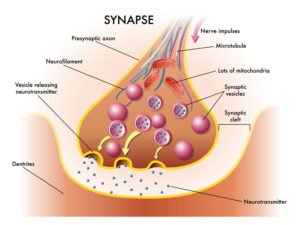
They do this by blocking neurons’ ability to reabsorb serotonin after its release into the synapse (space between the cells).
You see, when your neurons can’t ‘suck’ the serotonin back in via their receptors, it stays around longer in the synapse (activity increases). The end result is that there is more serotonin activity in the brain. SSRIs, as their name suggests, are specific to serotonin and that’s exactly what they do, they make serotonin stay alive a little longer in the synapse., but they don’t have much effect on your other neurotransmitters.
Herbal antidepressants do however, they impact many different neurotransmitters all at once. If you’d like to read about 8 Ways to Save Your Brain, Learn Faster and Calm Down, CLICK HERE to read my article on that.
St. John’s wort also inhibits the reuptake of serotonin. In this respect, its mechanism of action is actually very similar to that of SSRIs. However, its action is actually far more broad than that. St. John’s wort also blocks the reuptake of dopamine and norepinephrine, with equal effect on all three of these neurotransmitters.
Even more incredible, St. John’s wort seems to have a similar effect on GABA (your sleep hormone) and its precursor glutamate. This ability to affect a broad range of neurotransmitters at once is remarkable and was outlined back in 2003, in an ARTICLE that was published in Pharmocological Research.
Does it work like Celebrex?
When you think of Celebrex (celecoxib), you think of an anti-inflammatory drug. It’s fascinating that even St. John’s wort has anti-inflammatory properties and the ability to act just like Celebrex (as a COX-2 inhibitor). You can read about that if you want to CLICK HERE.
This anti-inflammatory effect and unique ability to suppress iNOS, IL-6 and COX-2 may be a crucial part of its antidepressant action. This is because research has demonstrated that inflammatory chemicals in the brain occur in depressed patients. In fact, some researchers even believe that brain inflammation is the primary cause of depression, with the neurotransmitter changes coming later. As an anti-inflammatory, St. John’s wort could help with depression as well as a huge variety of other health problems.
Does St. John’s wort really work?
The study results are definitely mixed but the consensus is that it works for mild to moderate depression, NOT severe. Overall, if you look at all of the evidence put together, St. John’s wort works about as well as prescription antidepressants… but again, for mild to moderate depression. For severe depression, it doesn’t seem to be extremely effective. It also has fewer side effects than the prescription meds do. CLICK HERE for a scientific article regarding all of this.
In some of the studies, St. John’s wort doesn’t seem to work – and, in many of these same studies as well as in others, neither do the prescription antidepressants. Depression is complicated, and a single treatment obviously won’t work for everyone. It’s important to consider a variety of lifestyle factors. Exercise and light exposure have both been shown to be effective in treating depression. Your diet, social network, sleep amount and quality, and stress levels can also impact your mood. A huge player, especially in anxiety and insomnia is MSG.
You’d be surprised where you get it. Related to that is free glutamate, which acts similarly to MSG and is found in high quantities in many “good for you” types of food such as seaweed, bone broth and teriyaki/soy sauce. You can CLICK HERE to read, How Your Gut Flora Contributes to Anxiety.
MSG is also sometimes found in Chinese food. Now one more thing before I leave depression. I would be remiss if I didn’t mention magnesium. It is known as a “chill pill” and commonly ordered by holistic practitioners for both depression and migraines. I wrote an article about a specific type of magnesium, CLICK HERE to read, Your Brain Loves Magnesium Threonate.
Warning: Never Combine St. John’s Wort with Antidepressants
Although St. John’s wort can be effective in treating depression, it also carries some risks, so it isn’t right for everyone. When combined with other medications, it can either cause a serious side effect or can interfere with the actions of the other drugs. It may be an herb, but you still need to be careful with it! Herbs are plant-derived drugs, and therefore they are still “drugs.”
While a boost in serotonin may have a positive impact on mood, it’s also very possible to have too much serotonin. This is called Serotonin Syndrome, and it’s a medical crisis. The symptoms include increased heart rate and blood pressure, fever, diarrhea, and muscle rigidity. When severe, serotonin syndrome causes seizures, irregular heartbeat, faintness or unconsciousness, and even death. This can easily happen if you take St. John’s wort with another serotonin-raising medication, such as an antidepressant.
Because the compounds in St. John’s wort raise serotonin, it’s very important to avoid taking it along with other medications that raise serotonin. SSRIs are, by design, excellent at raising serotonin. If you’re already taking a prescription antidepressant, DO NOT simply add St. John’s wort to your regimen.
If you’re trying to get off of your prescription drug and replace it with St. John’s wort, you need to wean off of the prescription first, and that takes a long time, and then you introduce the herb and I’m not telling you to do that, I’m simply informing you of how that’s done so you don’t get excited about St. John’s wort and start self-treatment. There are many nuances. So this is best done under the supervision of a healthcare professional.
You can consider reading my other aritcle, How Your Mental Health Is Affected By Homocysteine, Serotonin And Interleukin-8.
Interactions
St. John’s wort can also affect the metabolism of a huge variety of medications. It can make the activity go up or down, depending.
This is because it affects a system of liver enzymes that you have called Cytochrome P450, which is the ‘sanitation’ system that your liver uses to break down toxins in your body.
This process breaks down the truly toxic chemicals that we’re all ingesting every day – and also most medications that you take. If CP450 enzymes slow down, toxins build up. If the enzymes speed up, the medications you take don’t work as well as they should.
St. John’s wort increases the activity of some of the cytochrome P450 enzymes. That means the medication you’re taking is broken down faster, so it may not work as well. The effect can be serious; there was unfortunately a death attributed to this mechanism in a patient who had recently undergone organ transplantation.
St John’s wort caused the immunosuppressive drugs the patient was taking to be broken down faster, which prevented them from working. The patient reacted to the new organ and suddenly rejected the transplant. Because of the severity and unpredictability of the interactions, some countries including France have banned the use of St. John’s wort in over-the-counter formulas. In some other countries, St. John’s wort is only available with a prescription.
There are many precautions associated with St. John’s wort. It is usually taken at night to start, and if you take it two or three times a day, the dosage is split up during the day. Everyone’s reaction is different, some people find it stimulating, others sedating.
There are allergies associated with any herb. A serious allergic response may cause asthma, or wheezing or some other choking sensation, throat or lip/tongue swelling swelling, nausea, itching, rash or hives.
Warning
Be extremely careful with this herb (or preferably avoid it) if you’re taking any of the following categories of medication, as St. John’s wort may impact levels up or down:
- Birth control pills
- Warfarin (used to prevent blood clots)
- Digoxin (used for abnormal heart rhythm)
- Theophylline (used for asthma)
- Indiravir (used for HIV)
- Cyclosporine (an immunosuppressant)
There are also other medications that interact, my list is incomplete. A complete list of every medication that interacts with St. John’s wort would be very long. Basically, if you’re taking any other medications and you’re considering taking St. John’s wort, it’s best to inform your holistic healthcare practitioner so that he or she can review the combination for any important drug interactions.
If you’re using it topically as some people do, it’s probably not a big deal. You may not realize this but little bottles of topical St. John’s wort are sold, and you apply it to the skin. It is very healing for minor wounds and cuts.
Please take depression seriously!
Please take depression seriously! If you’re feeling depressed, please make sure that you get help with this. Depression can lead to fatal consequences and should be taken seriously by everyone in the family. Here is an infographic to highlight some of the most common symptoms associated with this condition.
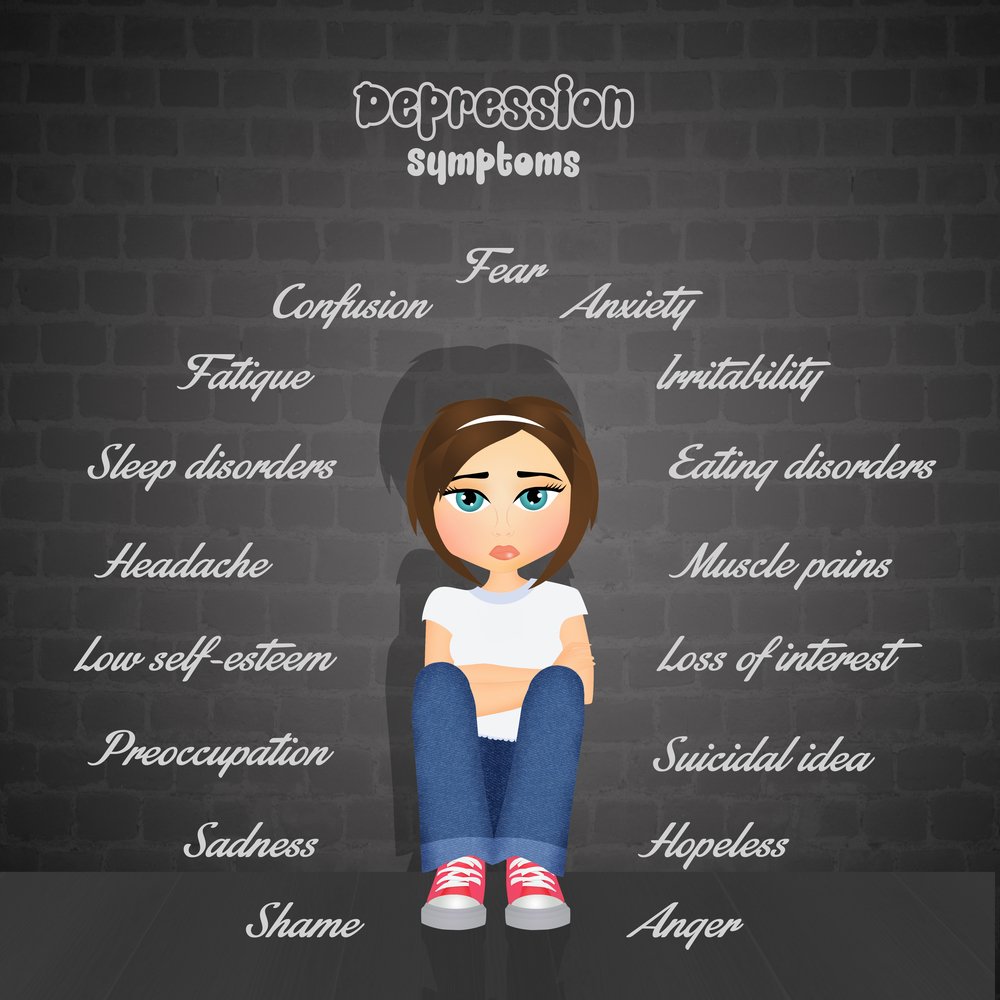
It is situational and fleeting for some, and life-long for others. Anhedonia and suicide are linked to severe depression. A friend of a friend recently committed suicide this past month, and I’m still sad even though he was more of an acquaintance. So again, I urge you to hold on, do something proactive and if it’s not you, keep an eye on your loved ones. They sometimes hint at suicide before they actually ‘off’ themselves. Be cued in the best you can be to their words, actions and lifestyle changes. If you’re sad as you read this, find out why crying is good for you by CLICKING HERE to read, Don’t Hold Back Your Tears.
Although St. John’s wort can be effective for mild to moderate depression, I don’t recommend trying to treat depression entirely on your own. It’s really important to have someone else watching out for you.
Treatment for severe depression is not as easy as popping a single pill, or an herbal remedy. Remember, St. John’s wort doesn’t even work well for severe cases.
If you would like to try St. John’s Wort Tea, CLICK HERE for a recipe.
If you’re feeling depressed, please make sure that you get professional help and make lifestyle or relationship changes if necessary.
Depression can lead to fatal consequences and should be taken seriously by everyone in the family. It is fleeting for some of you, and life-long for others. Anhedonia and suicide are linked to severe depression. Be sure to tell your loved ones and friends just how much you need them in your life. Treat everyone, even new acquaintances with kindness, you have no idea what they’re suffering with. One kind word, or special text can make all the difference to a person who is empty inside.

Suzy Cohen, has been a licensed pharmacist for over 30 years and believes the best approach to chronic illness is a combination of natural medicine and conventional. She founded her own dietary supplement company specializing in custom-formulas, some of which have patents. With a special focus on functional medicine, thyroid health and drug nutrient depletion, Suzy is the author of several related books including Thyroid Healthy, Drug Muggers, Diabetes Without Drugs, and a nationally syndicated column.

